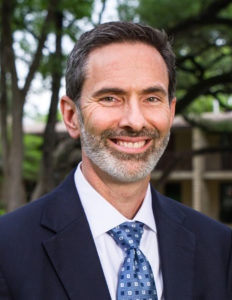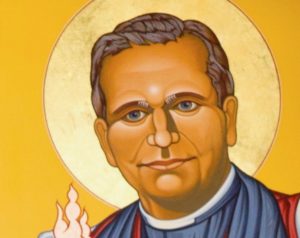October, 9, 2018 is John Hines Day, when Seminary of the Southwest pauses to remember the founding vision of Bishop John Hines, and celebrate the members of the John Hines Legacy Society.
The day was Thursday, October 15, 1964. The St. Louis Cardinals were playing host to the New York Yankees in game seven of the World Series. The Cardinals had scraped their way to the National League pennant thanks to a late-September 10-game losing streak by the Philadelphia Phillies. The Yankees were seeking to ride the final wave of their 1950s dynasty built by Mantle, Maris, Ford, and Berra. And sitting in the seats watching that game were Scott Field Bailey and John Hines. They were in St. Louis for the 63rd General Convention of the Episcopal Church and had slipped out to catch the game. Two days later, John Hines would be elected the 22nd presiding bishop.
Like the Cardinals, Hines was an underdog. Both Hines and Bailey were convinced that night, as they watched the game, that he would not be elected; his friend Stephen Bayne, just coming off of a five-year term as the first executive officer of the Anglican Communion, seemed to be a shoe-in for the position. But history or providence intervened. The Cardinals won, and so did John Hines.
Today we celebrate the legacy, the passion, the vision, and the tenacity of our founder. John Hines is best known for his work as presiding bishop of the Episcopal Church, but here in Austin, he is remembered for founding Seminary of the Southwest.
Hines looked around the church in 1950 and decided that it needed “a new kind of theological school.” Always the bold orator, Hines called for a “revolutionary seminary” that would turn out “mature men of God instead of adolescents.” (I will not dwell on what his statement suggests about the other Episcopal seminaries.)
From his early days as rector of St. Paul’s in Augusta, Georgia, Hines took on the pressing social issues of his day. A child of the South, born in 1910, he knew that racism was the besetting sin of the nation. But he also spoke out for the inclusion of women in church leadership and for all who were poor, downtrodden, and without voice.
John Hines was a magnanimous soul, who, though born in South Carolina, developed Texas-sized ambitions for the church. The Episcopal Church, he argued, needed to be ready to take up its cross and lose its life in order to save its life. He made this clear in his words to General Convention in 1970:
The Body of Christ must be prepared to offer itself up for the sake of the healing and the solidarity of the whole human family, whatever its religious or racial identities. Especially must the Body of Christ risk its own life in bearing and sharing the burdens of those who are being exploited, humiliated, and disinherited!
You can imagine that this was not a message that resonated well with those church leaders who were committed to a worldly measure of success. It was well-known that Hines was not much of an administrator or fundraiser, partly because he was ready to lose the church in order to find it.
The thing about John Hines is that he was something of a biblicist in the best kind of way. He had no time for those who sought to explain away Jesus’ hard teachings by adding a thousand common-sense qualifiers to explain what Jesus must have really meant or why it’s just unrealistic to follow Jesus’ words too closely. Hines’ theology was the simple gospel. This is not to say he was simplistic, only that he was straightforward in his desire to follow the way of Christ. This is how his theological orthodoxy met up with social progressivism.
He saw racism and he knew that this is not how Jesus would treat people. He saw poverty and he knew this is not how Jesus wanted people to live. He saw modern warfare and called it “inimical” to the “ethics of Jesus Christ.” He had the confidence of a man who did not seek comfort by making Jesus more complicated than he was. He eschewed the self-serving conditions, provisos, and stipulations that allow most of us to encounter Jesus and then return to the life we were living.
To be a magnanimous church – a church willing to open wide its heart for the sake of the world – will require the kind of tenacity that John Hines displayed. And it will mean making some people angry. But if we were afraid of making people angry, we wouldn’t be celebrating John Hines.
The victory of the ’64 Cardinals proved a turning point in baseball – both because it put an end to the Yankees dynasty and because it proved the wisdom of the National League’s willingness to sign black and Latino baseball players. The Yankees general manager, George Weiss, would only sign white players and seemed to want only white fans. On the other hand, the Cardinals owner, Gussie Busch, was willing to sign anyone who would help him win. By 1964, the Cardinals had assembled a team that included several black athletes, two of whom would be future hall-of-famers: Bob Gibson and Lou Brock.
Bob Gibson was pitching game seven of the series on just two days rest after pitching a complete game victory in Game 5. Scott Field Bailey and John Hines looked on from the stands. By the time he got to the ninth inning, Gibson was visibly spent, and he gave up two runs, putting the tying run on deck. But his manager, Johnny Keane, did not pull him out. Bob Gibson pitched the team to a 7-5 victory and a World Series title. Keane later defended his decision to let Gibson finish the game by saying, “I had a commitment to his heart.”
Keane knew, consciously or unconsciously, that the right thing to do, not just for his team but for baseball and for Bob Gibson and for African-American athletes and for the dim hope of some kind of equality, was to let Gibson bring down the Yankees. That night in October 1964, John Hines witnessed greatness from an African-American pitcher, as well as magnanimity from the St. Louis manager, and he went on to lead The Episcopal Church with his own large-hearted aspirations for justice, aspirations that we rightly celebrate today.
Who are the ones in our day who are “exploited, humiliated, and disinherited”?
What would it look like for the Body of Christ to bear and share their burdens?
 Dr. Scott Bader-Saye, acting dean and president, joined the seminary faculty as the Helen and Everett H. Jones Chair in Christian Ethics and Moral Theology in 2009 and has served as academic dean since 2013.
Dr. Scott Bader-Saye, acting dean and president, joined the seminary faculty as the Helen and Everett H. Jones Chair in Christian Ethics and Moral Theology in 2009 and has served as academic dean since 2013.
His current research centers on theological readings of gender and transgender. Other research interests include economy, sexuality, political theology, virtue ethics, and interfaith dialogue. He teaches the core Theological Ethics courses for all degree programs. He is author of Formed by Love (2017), Following Jesus in a Culture of Fear (2007), and Church and Israel After Christendom (1999/2005). He has contributed to The Blackwell Companion to Christian Ethics (2006) and The Cambridge Companion to the Gospels (2006) and has published widely in theological journals and magazines.
Dr. Bader-Saye helped found and lead Peacemeal, a missional Episcopal community in Scranton, Pennsylvania, served on the Episcopal Church Executive Council Economic Justice Loan Committee, currently serves on the Gathering of Leaders Steering Committee, and is active as a teacher and parishioner at St. Julian of Norwich Episcopal Church, a mission in northwest Austin.
AB, Davidson College
MDiv, Yale Divinity School
PhD, Duke University


